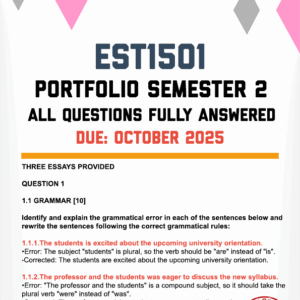Description
IOP1502 ASSIGNMENT 1 SEMESTER 1 2025 | Fully Answered- Distinction guaranteed!
QUESTION 1 (10)
With the tourism context in mind, match the concepts below with the correct definitions/descriptions:
1. Domestic tourism A. It is unique, perhaps, in that it is driven by a sense of duty and obligation rather than a search for pleasure and leisure.
2. Inbound tourism B. Residents of a given country travelling only within that country.
3. Esteem C. Largely about trade and transporting goods.
4. Religious tourism D. Food, water and air.
5. Business tourism E. Friendship and family.
6. Cultural tourism F. The pleasure seeker market is traditionally associated with younger people.
7. Outbound tourism G. Residents of one country travelling in another country.
8. Physiological H. Non-residents travelling in a given country.
9. Hedonistic tourism I. Holiday motivated by a desire to sample national, regional or local food and wine.
10.Love/belonging J. Confidence and achievement.
QUESTION 2 (10)
Indicate if the statements below are TRUE OR FALSE.
a. UNWTO in relation to tourism stands for Unilateral Nations World Tourism
Organization.
b. Satisfaction equals perception minus expectation.
c. Tourists’ personal determinants always remain constant throughout their lives.
d. High levels of insecurity are associated with the intangibility of tourism products, making consumers rely on external sources for quality assurance.
e. The role of technology in travel behaviour is primarily limited to the postconsumption phase of the travel experience.
f. High levels of insecurity are associated with the intangibility of tourism products, making consumers rely on external sources for quality assurance.
g. Tourism products are typically tangible possessions that tourists can take home as souvenirs.
h. Physiological needs are the highest-order level needs.
i. Tourists typically make completely rational decisions based on perfect information when planning their holidays.
j. During the pre-consumption stage travellers obtain the information necessary for planning trips and evaluate and select alternatives.
QUESTION 3 (5)
Discuss five (5) characteristics of services and give examples.















Reviews
There are no reviews yet.